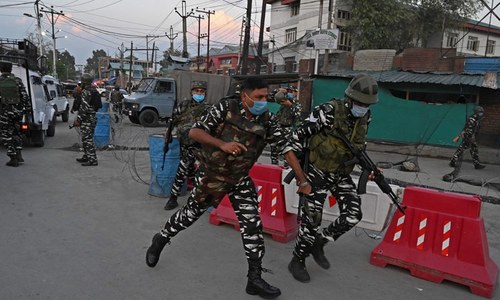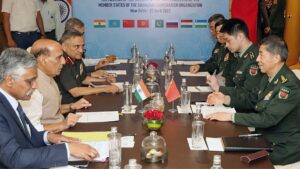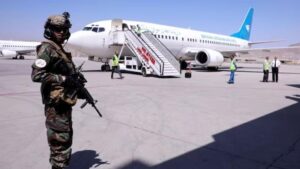India fears Taliban fallout in Kashmir

India fears Taliban fallout in Kashmir
SRINANGAR: As Prime Minister Narendra Modi set out his Taliban stresses to world pioneers this week, armed force arranged attacks and fought Kashmir aggressors who he fears could be encouraged by the Islamists’ triumph in Afghanistan.
Kashmir rebel shootings of regular folks and police, attacks by the security powers on psychological militant refuges, and guerilla penetrations across the India-Pakistan truce line have all expanded in the Muslim-greater part district since the Taliban overran Kabul on August 15.
Around 40 individuals have been killed in shootings and conflicts in the two months from that point forward in the Himalayan district, which has been partitioned since India and Pakistan became free in 1947.
Fear based oppressors have designated minority Hindu and Sikh regular folks, while firearm fights close the truce line have likewise left warriors and revolutionaries dead.
India has not straightforwardly faulted the Taliban takeover for the uptick in viciousness, yet it has strengthened watches close to Pakistani Kashmir and sustained some military camps, as indicated by occupants and security authorities who addressed AFP on state of namelessness.
Modi told a G20 highest point in Rome recently that worldwide endeavors were expected to ensure Afghanistan doesn’t turn into a place of refuge for “radicalisation and illegal intimidation”.
He has likewise raised India’s interests with US President Joe Biden.
In September, he let the UN General Assembly know that no nation should be permitted to utilize Afghanistan “as an instrument for its own egotistical advantages” – a remark broadly seen as a source of perspective to adjoining Pakistan, the main sponsor of the Taliban’s 1996-2001 system.
This time, Islamabad has avoided perceiving the new Taliban government.
All things considered, New Delhi blames its most despised opponent in Islamabad for fuelling Pakistan-based aggressor bunches Lashkar-e-Taiba and Jaish-e-Mohammad, which are faulted for some assaults in Kashmir.
Pakistan denies the case.
India was a benefactor of the Soviet-manikin government in Kabul that was ousted by mujahideen powers in 1992.
In 2001 it helped the US-drove powers that brought down the Taliban. Furthermore, it was a significant giver to the public authority that the hardline Islamists squashed in August.
Afghan assailants battled close by Kashmir contenders during the 1980s and 1990s. Around 20 Afghan “visitor mujahideen” were killed and 10 were caught, as per a previous Kashmiri warrior.
India stresses that weapons and contenders could again arrive at the area, over which it has battled two fights Pakistan.
“What we can say and gain from the past is that when the past Taliban system was in power, that time certainly we had unfamiliar fear mongers of Afghan beginning in Jammu and Kashmir,” said India’s tactical head of staff General M.M. Naravane.
“So there are motivations to accept that exactly the same thing may happen indeed.”
Fights are basically outlandish in Kashmir in view of limitations forced by Delhi since the district’s semi-independent status was renounced in 2019.
However, some in Kashmir have unobtrusively invited the Taliban takeover of Afghanistan as a triumph against the chances that they also can seek to one day.
“In the event that they can overcome the world’s biggest military force, we see a likelihood that we also can win our opportunity,” one money manager in the fundamental Kashmir city of Srinagar told AFP, declining to be named.
A previous Kashmir aggressor who prepared in Afghanistan during the 1990s and battled close by Afghan mujahideen in Kashmir added: “The Taliban triumph has as of now provided oxygen to our development.”
Given India’s security clampdown on Kashmir, Naravane and other military bosses are certain that Delhi can adapt to any flood.
Be that as it may, talking on state of secrecy, a senior security official in Kashmir said “there is some frenzy” inside the security foundation.
Michael Kugelman, a South Asia expert at the Wilson Center in Washington, said Afghanistan’s new rulers could rouse “moved forward distress” in Kashmir.
Taliban authorities have said they need to keep up with exchange and different binds with India, implying that some sort of contact should be kept up with.
“The actual Taliban will not shake for distress in Kashmir, however those it is lined up with likely will do as such,” he said.
Mosharraf Zaidi, an editorialist and security investigator in Pakistan, said he saw no explanation the Taliban would need to “purposely unsettle the Indian specialists”.
Their triumph, he accepts, is more significant for the sign it ships off “youthful Kashmiri young men and young ladies watching the pictures from Afghanistan”.





